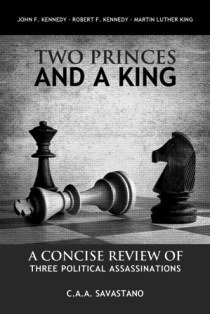"The Oswald Question"
"Lee Harvey Oswald's final year in the United States Marines was 1959. Among his acquaintances in that year was John Donovan, the officer in command of Oswald’s radar crew. Donovan is a former employee of the Federal Bureau of Investigation. During Commission testimony Donovan stated, “he was not sloppy…I found him competent in all functions…he subscribed to a Russia newspaper…was interested in learning Russian…in some respects he was probably better informed than most people in the Marine Corps, namely, on international affairs.” This is not the seeming underachiever many believe Oswald to be. “…I never heard him in any way, shape, or form confess that was a Communist, or that he ever thought about being a Communist.” Oswald’s committed Marxist views are perhaps not as overwhelming as officials imagine.
Oswald subsequently defects to Russia during the fall of 1959; yet the authorities do not revoke his citizenship. Oswald remains a citizen of the United States despite his location. Oswald chooses Helsinki, Finland to begin the process. This is notable because it requires improbable luck or knowledge of intelligence matters from official sources. The Central Intelligence Agency was aware that Finnish authorities were focusing on Soviet, not American or English espionage in the area. He appeared within local Dallas newspapers following his successful defection.
Oswald’s wife is the subject of extensive legal wrangling by officials. Officials deny her request for immigration, despite alternate official recommendations for a waiver. The Department of State suggests Marina Oswald be informed to obtain a visa from a different country to circumvent the legal sanction. It took a special pleading by the State Department to convince the Immigration and Naturalization Service to reverse the initial decision. Subsequently, officials reverse their decisions, despite Marina not qualifying for immigration status according to regular policies. Mrs. Oswald, the Russian immigrant wife of a defector receives her visa on May 24, 1962, the same day she applied.
Lee Harvey Oswald, the previous Russian defector returns to America with a new family. The confirmed traitor receives a loan from the American State Department, despite official requirements of “loyalty to the United States Government”. He was not arrested and held various jobs and raised a family. Could the Central Intelligence Agency have been ignorant after they debriefed Oswald when he returned to America?" - Chapter 1 - Two Princes And A King
"The legal guilt of James Earl Ray"
"In the death of President Kennedy, the conspiracy and innocence of the official assassin have a possible link. Oswald’s possible innocence emerges from recorded proof and testimony. Ray conversely was an escaped prisoner; this does not imply his innocence. Unlike Oswald, James Earl Ray did plead guilty to the charge of King’s murder.
Unlike Oswald, Ray actually had legal counsel, despite the many deficiencies of his earlier representation. Using facts and the President’s (Warren) Commission timeline, doubt exists for Lee Harvey Oswald. Whereas Ray cooperated, confessed, and initially accepted his guilt. James Earl Ray’s plea of guilt is verifiable. Yet did Ray have assistance beyond his means?" - Chapter 9 - Two Princes And A King
"The methods of J. Edgar Hoover"
“COINTELPRO” was the illegal method Hoover used to sidestep the jurisdictions of agencies like the Justice Department. It went far beyond information gathering and investigating people to include hundreds of violations of law. Its objective was to destroy an entire organization and the lives of all connected to a targeted leader. COINTELPRO is eventually defined by the House Select Committee on Assassinations as “...never a legitimate FBI function…described in Dr. King’s case as an active covert campaign intended to influence 'political choices and social values'..." The Committee additionally states, “It must be concluded that in its COINTELPRO activities, the Bureau grossly abused and exceeded its legal authority” - Chapter 11 - Two Princes And A King
"The Los Angeles Police, the Bureau, and the Agency"
"The Los Angeles Police Department's actions potentially would remain unknown. Left to their own devices, the Bureau and Agency would allegedly have concealed the evidence again. The similarities among feasible conspiracies repeat as each unfolds. Once more local authorities mismanaged and summarily destroyed evidence at the crime scene.
Federal and Local government ignored the public outcry for answers. Authorities withheld a number of important documents for many years. In reviewing the most famous assassinations in modern American history, three exist in which evidence is repeatedly lost and altered. It was twenty or more years until American leaders provided access to remaining evidence. Many surviving files are public knowledge and offer serious questions. Officials do not welcome them." - Chapter 15 - Two Princes And A King
"Foreshadowing"
"Related threats to Senator Kennedy began in May 1968, while he was in transit. Van Nuys Police report a shower of rocks hit Senator Kennedy from an overpass in his open convertible. The report exposes obvious holes in Senator Kennedy’s security. Authorities believed several youthful persons were responsible. This was subsequent to police receiving a not so youthful anonymous death threat against Kennedy." - Chapter 15 - Two Princes And A King
"Campaign worker John Ahrndt viewed Sirhan at Kennedy campaign headquarters. This occurred weeks before the attack on Senator Kennedy. This statement substantiates the testimony of other eyewitnesses. This may indicate Sirhan and others began stalking the Senator long before most investigators were aware. These possible sightings offer additional circumstantial evidence." - Chapter 15 - Two Princes And A King









